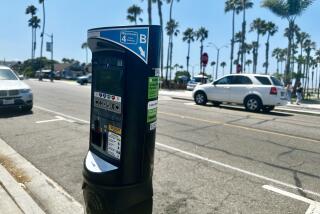New Area Code Lets Some Ditch ‘the 909’ Scorn
It took only 12 years for “the 909” to develop a reputation.
Since its inception in 1992, the area code has become synonymous with the Inland Empire -- a badge of pride for locals and a target for ridicule by L.A. radio deejays and others from more trendy Southern California locales.
Love it or hate it, western Riverside County will be ditching the 909 area code starting this Saturday with the dawn of the 951.
The change carves out the new area code along the border of San Bernardino and Riverside counties, leaving western San Bernardino County and portions of Los Angeles County custody of the 909 moniker.
The change takes effect Saturday, but callers can use the 909 area code until Oct. 30. After that, callers must dial 951. The 760 area code in the eastern portions of Riverside and San Bernardino counties remains in use.
The California Public Utilities Commission voted in November to create the new area code to deal with a shortage in phone numbers.
Usually, switching a community’s area code creates an uproar. The PUC’s attempt to impose a 424 area code in the South Bay ignited a six-year revolt by local business, residents and politicians.
In the land of “the 909,” it’s been quite the opposite.”[Riverside County] was the only area in California where the business community asked for the change,” said PUC Commissioner Loretta Lynch, who voted against the change. “They wanted to be distinct from San Bernardino.”
Lynch believes Riverside officials wanted to shed the 909 area code because of its negative baggage.
“The 909” has been depicted as a low-class backwater on the television show “The O.C.” and by radio deejays, including KROQ’s Kevin and Bean.
Lynch argued that the new area code was unnecessary, since there are about 793,000 phone numbers still available in the 909 area code, and 1.2 million more could be available if the PUC reclaims unused numbers from telephone companies.
But other commissioners, realizing the growth in the Inland Empire, feared that numbers could become scarce. Since there was no major opposition, the PUC adopted the new code.
Cindy Roth, president of the Greater Riverside Chambers of Commerce, discounted the notion that the image of “the 909” motivated her organization’s support for the switch. She said a new area code was inevitable.
But the image of “the 909” is not dead to some, such as Jim Stewart of Riverside.
Stewart, 27, attended UC Riverside, and his experience in the area led him to write a book, “The 909,” with Riverside as the backdrop to his fictional story about young people and their relationships. He said he was inspired by the people in the region, whom he found much less materialistic and image-conscious than those he grew up with in Orange County.
“I think Riverside is really losing its identity,” Stewart said, adding that he thinks the negative view some people have of the area will remain, even without “the 909.”
The 909 area code was born when western Riverside County and San Bernardino County split from Orange County’s 714. So the region has been through an area code split before, and some people don’t think this one will cause problems.
It will be an inconvenience for many, especially businesses. Business cards, letterhead, fax cover sheets and products will have to be reprinted.
Cell phone numbers are affected by the switch, but which ones depend on where the accounts are based. Customers should call their cell phone service providers if they are unsure if they are affected.
Despite the adjustments, at least one person who could benefit said the concern about the switch is mostly unwarranted. Justin Tracy, the owner of PIP Printing in Riverside, said the perception that people have of a surge in printing needs is overblown because business owners have to replenish their office supplies anyway.
Trish Kretzchemar recently opened the Beauty Mark by Trish in Riverside. Although all of her business cards and other supplies bear the 909 area code, she does her own printing and said she doesn’t see the change as a problem.
“There are a lot of issues that are more important than the area codes,” Kretzchemar said.
More to Read
Sign up for Essential California
The most important California stories and recommendations in your inbox every morning.
You may occasionally receive promotional content from the Los Angeles Times.










